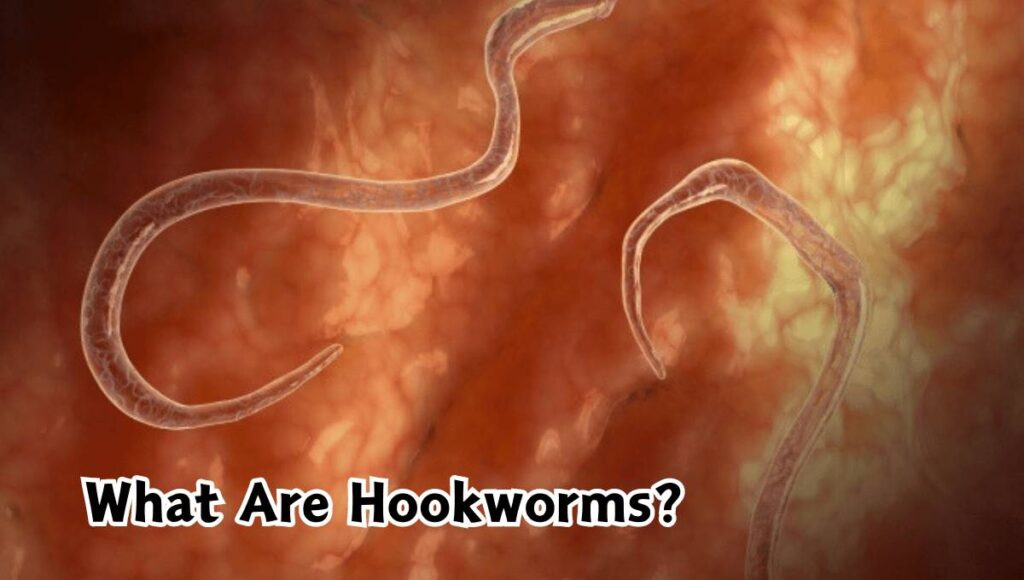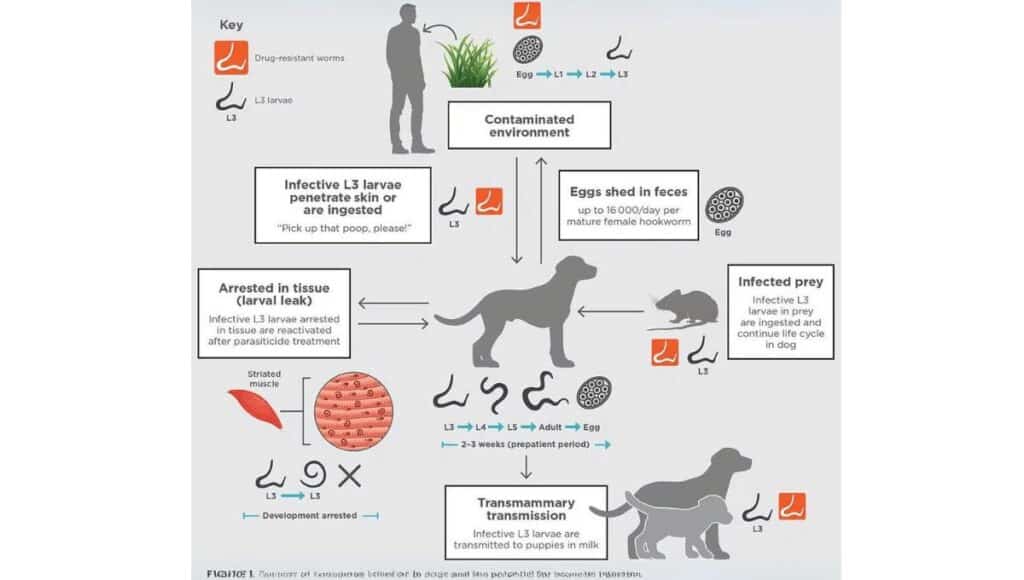As dog owners, we all want to ensure our pets are healthy and happy. However, some threats are invisible, lurking inside our pets without us even realizing it. One such threat is hookworms in dogs. These tiny parasites can wreak havoc on your dog’s health if left untreated. In this article, we’ll explore what hookworms in dogs are, how they affect dogs, and what you can do to protect your furry friend from this pesky parasite.
Table of Contents
What Are Hookworms?

Hookworms are small, thin parasites that live in a dog’s intestines. They attach themselves to the intestinal walls using their hook-like mouthparts, hence the name “hookworm.” These parasites feed on your dog’s blood, which can lead to severe health issues if the infestation is large. Hookworms are part of a larger group of parasites called “helminths,” which also include roundworms and tapeworms. Unlike tapeworms, hookworms are not visible to the naked eye, making them harder to detect in your pet.
How Do Dogs Get Hookworms?
Dogs can contract hookworms in several ways. Puppies are especially vulnerable because they can get hookworms from their mother, either through the placenta before birth or through the mother’s milk after birth. Adult dogs typically become infected by coming into contact with contaminated soil, feces, or through the ingestion of infected prey. Hookworm larvae can also burrow through a dog’s skin, making it even easier for the parasite to infect your pet.
Symptoms of Hookworms in Dogs
Hookworm infection in dogs can be tricky to detect, especially in the early stages. However, as the parasites grow in number, symptoms start to appear. Some of the common signs of hookworms in dogs infestation include:
- Pale gums – Due to blood loss, as hookworms in dogs feed on the dog’s blood.
- Weight loss – An infected dog may lose weight despite maintaining a normal appetite.
- Diarrhea – Sometimes accompanied by blood.
- Lethargy – The dog may appear unusually tired or sluggish.
- Coughing – In cases where the hookworm larvae have traveled to the lungs.
It’s important to note that puppies can be more severely affected by hookworms in dogs than adult dogs due to their smaller size and weaker immune systems.
How Hookworms Affect Dogs
Once hookworms in dogs latch onto the dog’s intestines, they start feeding on blood. A single hookworm in dogs may not cause significant harm, but a large infestation can result in anemia, especially in puppies and older dogs. Anemia is a condition where the blood lacks enough red cells to carry oxygen throughout the body. Severe cases can even lead to death in puppies if left untreated.
Hookworms in dogs also secrete an anticoagulant, which means that even after the worm moves to another part of the intestinal tract, the wound left behind continues to bleed. This can exacerbate the dog’s anemia and lead to further complications.
Diagnosing Hookworm Infections
If you suspect your dog might have hookworms in dogs, the first step is to visit your vet. The vet will likely request a stool sample from your dog to examine under a microscope. Hookworm eggs are usually present in the stool and can be easily identified by a trained professional. Sometimes, the vet may recommend blood tests to check for anemia, which is a common side effect of severe hookworm infections.
Treatments for Hookworm Infections

Fortunately, hookworm infections are treatable. The most common treatment involves deworming medications such as pyrantel pamoate, fenbendazole, or milbemycin. These medications kill the adult hookworms in dogs in the intestines. However, because these medications don’t always kill the hookworm larvae, a second round of treatment might be necessary after a few weeks to target any newly matured worms.
In severe cases where the dog has become anemic, your vet may recommend iron supplements or even a blood transfusion to help restore your dog’s health. Regular follow-up treatments and stool checks are essential to ensure that the infection has been completely eradicated.
Preventing Hookworm Infections
Preventing hookworms in dogs is much easier than treating them. Here are some practical steps you can take to protect your dog from these parasites:
- Regular Deworming – Make sure to deworm your dog regularly as per your vet’s recommendation. Some heartworm preventatives also protect against hookworms in dogs.
- Clean Living Environment – Keep your dog’s living area clean by regularly picking up feces and avoiding contaminated areas, like dog parks or areas where other dogs frequently defecate.
- Proper Nutrition – A well-fed, healthy dog is more likely to fight off infections, including hookworms.
- Avoid Contact with Stray Dogs – Stray dogs may carry a number of parasites, including hookworms.
By staying on top of these preventative measures, you can help your dog avoid this common but dangerous parasite.
Risks to Humans: Can You Catch Hookworms from Your Dog?
Yes, humans can catch hookworm in dogs, but the way the infection occurs is a little different. In humans, hookworm larvae can penetrate the skin, usually through the feet, when walking barefoot on contaminated soil. This causes a condition known as cutaneous larva migrans, where the larvae migrate under the skin, causing itchy, red trails. However, hookworms in humans do not typically reach the intestines, so the infection is less severe than in dogs. To prevent this, always wash your hands after handling your dog and avoid walking barefoot in areas that may be contaminated.
Are Hookworms Deadly for Dogs?
While hookworms in dogs are rarely fatal in adult dogs, they can be life-threatening for puppies, especially if left untreated. Severe anemia caused by hookworms can lead to death in young dogs if they don’t receive prompt medical attention. If you notice signs of lethargy, weight loss, or pale gums in a puppy, it’s essential to seek veterinary care immediately.
Long-Term Effects of Hookworms
In most cases, if treated early, dogs recover fully from hookworm infections without any long-term effects. However, in more severe cases, especially where anemia has set in, it may take some time for the dog to regain its strength. Chronic infections can lead to malnutrition, weakness, and delayed growth in puppies. For older dogs, long-term effects are less common, but the damage caused by the blood loss could affect their overall health if left untreated for an extended period.
When to See a Vet
If your dog displays any of the symptoms mentioned earlier, such as pale gums, diarrhea, or weight loss, it’s time to see a vet. Early detection is key to preventing serious complications from hookworm infestations. Even if your dog isn’t showing obvious symptoms, regular vet checkups, including fecal tests, are essential to catch any infections early. Hookworms in dogs are common but treatable, and with the right care, your dog can recover quickly and lead a happy, healthy life.
Trending: Can Dogs Eat Enoki Mushrooms: A Comprehensive Guide
FAQs
1. Can hookworms be prevented with regular vet checkups?
Yes, regular vet checkups that include fecal tests can help detect and prevent hookworm infections early on.
2. How long does it take for hookworms to be treated?
Most treatments for hookworms in dogs start working within a few days, but it may take several weeks and multiple treatments to completely eliminate the infection.
3. Are hookworms contagious to other pets?
Yes, hookworms in dogs can spread to other dogs, cats, and even humans, especially in areas where there is shared fecal contamination.
4. Can puppies die from hookworms?
Yes, hookworms can be deadly to puppies due to severe anemia caused by blood loss. Immediate treatment is crucial.
5. Can my dog get hookworms from playing outside?
Yes, dogs can pick up hookworms from contaminated soil, feces, or by ingesting infected animals like rodents.
By understanding the causes, symptoms, and treatments for hookworms in dogs, you can better protect your dog from this common parasite. Regular vet visits and proper hygiene practices are essential to keeping your pet healthy and happy.
6. What are the most common symptoms of hookworm infection in dogs, and how can I identify them early?
Common symptoms include anemia, diarrhea, weight loss, and lethargy. Early identification requires regular vet check-ups and monitoring for these signs. If observed, consult your veterinarian for a fecal examination.
7. How does hookworm disease in dogs progress, and what are the potential long-term effects if left untreated?Hookworm disease causes anemia and nutritional deficiencies. If untreated, it can lead to chronic anemia, poor growth, and weakened immunity, especially in puppies. Early treatment prevents severe health issues.
8. What preventive measures can I take to protect my pet from hookworm infection in dogs, especially in areas with high parasite prevalence?
Regular deworming, maintaining a clean environment, and avoiding contaminated areas are key. Practice good hygiene and schedule regular vet visits to ensure your dog remains parasite-free.
9. How are hookworm symptoms in dogs different from other parasitic infections, and when should I consult a veterinarian?
Hookworm symptoms, like anemia and bloody diarrhea, are distinct. Consult a vet if your dog shows signs of anemia, persistent diarrhea, or unusual lethargy for prompt treatment.
10. What treatments are available for hookworm in dogs, and how effective are they in eradicating the infection completely?
Deworming medications such as fenbendazole and pyrantel pamoate effectively kill adult worms. Multiple treatments and follow-up fecal exams ensure complete eradication and prevent reinfection.

